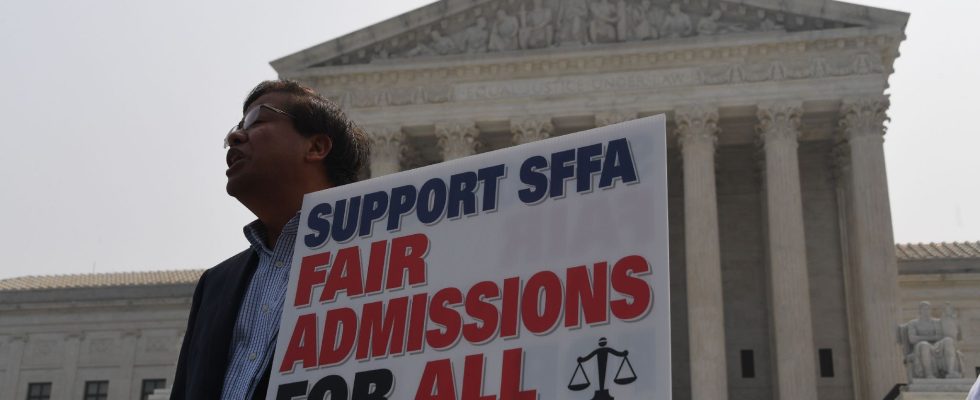How do you win a debate? In a scientific discussion, one wins by proving that what one says is true, and that what the opponent says is false. In politics, on the contrary, it seems that the way of arguing is not right and wrong, but loyalty to the foundation. Whether your founder is Romulus, Moses, George Washington or Marx and Lenin, you will only win your political debate if you can prove that what you are proposing is more in line with the spirit of the foundation than what your opponent is proposing. Obviously this “spirit” of the founders is subject to interpretation, which gives a lot of flexibility and play to your decisions (the situation in France is even more complicated – it would not be a question of making it simple – because each camp has different founders to whom to refer: let us quote in bulk Robespierre, General De Gaulle, Jaurès and Blum, Jean Monnet and Robert Schuman, Charles Martel…).
It is this sacred force of the foundation which explains why, with regard to the same question of the “government of judges” which crosses the whole of the West, Benjamin Netanyahu seems on the verge of having to back down on his judicial reform in Israel, whereas the American right triumphs in the Supreme Court: in one case, a very large sector of opinion accuses the right-wing leader of destroying the Israel of 1948, in the other, right-wing judges can overturn the major legal decisions of the fifty years claiming fidelity to the spirit and the letter of the Constitution: this is the meaning of their legal doctrine, originalism.
Having become predominantly right-wing since the mandate of Donald Trump, the American Supreme Court is now having a field day. His most notable decision was the end of the stoppage Roe v. wade, which protected the right to abortion. Its decision of June 29 is just as spectacular, since it makes anti-constitutional the practices of positive discrimination, so important in the functioning of American universities since the 1970s, in particular in an effort towards black American populations. These practices were contested by associations of Asian students, claiming to be discriminated against by Harvard and the others, with regard to their actual academic results.
One of the highlights of the decision is the very eloquent opinion of Clarence Thomas, a black judge, having grown up in the segregationist South, and fervent supporter of originalism. He insists on the fact that the Constitution knows no colors, that it guarantees the equal treatment of all citizens regardless of their race, he claims for blacks not to be treated “like victims” , in his words, but as free subjects, able to rise in society through merit and work.
Original sin
It is therefore in the name of equality before the law, a central principle of the American Constitution, that positive discrimination has been made illegal. Yet it was in the name of the same word equality that positive discrimination had been put in place. Equality was then seen as equality between social groups, through measures of reparation for disadvantaged groups, and not as formal equality between individuals, regardless of their past and their life circumstances.
The idea of positive discrimination in the name of equality, of the need for equal representation of minorities in all institutions and in all places of power, has been the central idea of the American left for many years. By attacking it, the conservative Supreme Court is winning a legal battle, but it is still far too early to know whether it will be followed by public opinion. US universities have already planned to use a line from Thursday’s decision (“Nothing prohibits universities from considering what an applicant says about how race has played a role in their life”) to continue to set up theaffirmative action. More generally, it’s unclear what their selection process will look like now, and it’s by no means said that it looks like what the right-wing judges hope. It doesn’t even say that the said right-wing judges would be happy with a result where 80% of Harvard students would be Chinese-Americans or Chinese nationals, which would happen if you only took the grades into account.
Slavery remains, more than a hundred and fifty years after its abolition, the original sin of the American republic. While it is entirely based on the choice of its inhabitants to live together and to govern themselves democratically, it finds itself with within it a population which has not chosen to be there, which has been uprooted from its roots. , dismembered, decultured, disaffiliated, which no longer has any country other than the United States while only being there because of the crime. The United States knew how to find in its laws the force to put an end to slavery, at the time of Lincoln, but the question of race relations has continued to haunt it since, in different forms. Affirmative action was the attempt to right wrongs suffered by black people. It failed to settle the problem of disparities of destiny, while ulcerating those Americans who want to believe in the power of individual merit and work alone. It has just been curbed today by the Supreme Court, but it does not seem that this decision will succeed in bringing the United States into a post-racial era.
*Essayist and associate professor of philosophy, Benjamin Olivennes is the author of “The other contemporary art” (Grasset).
